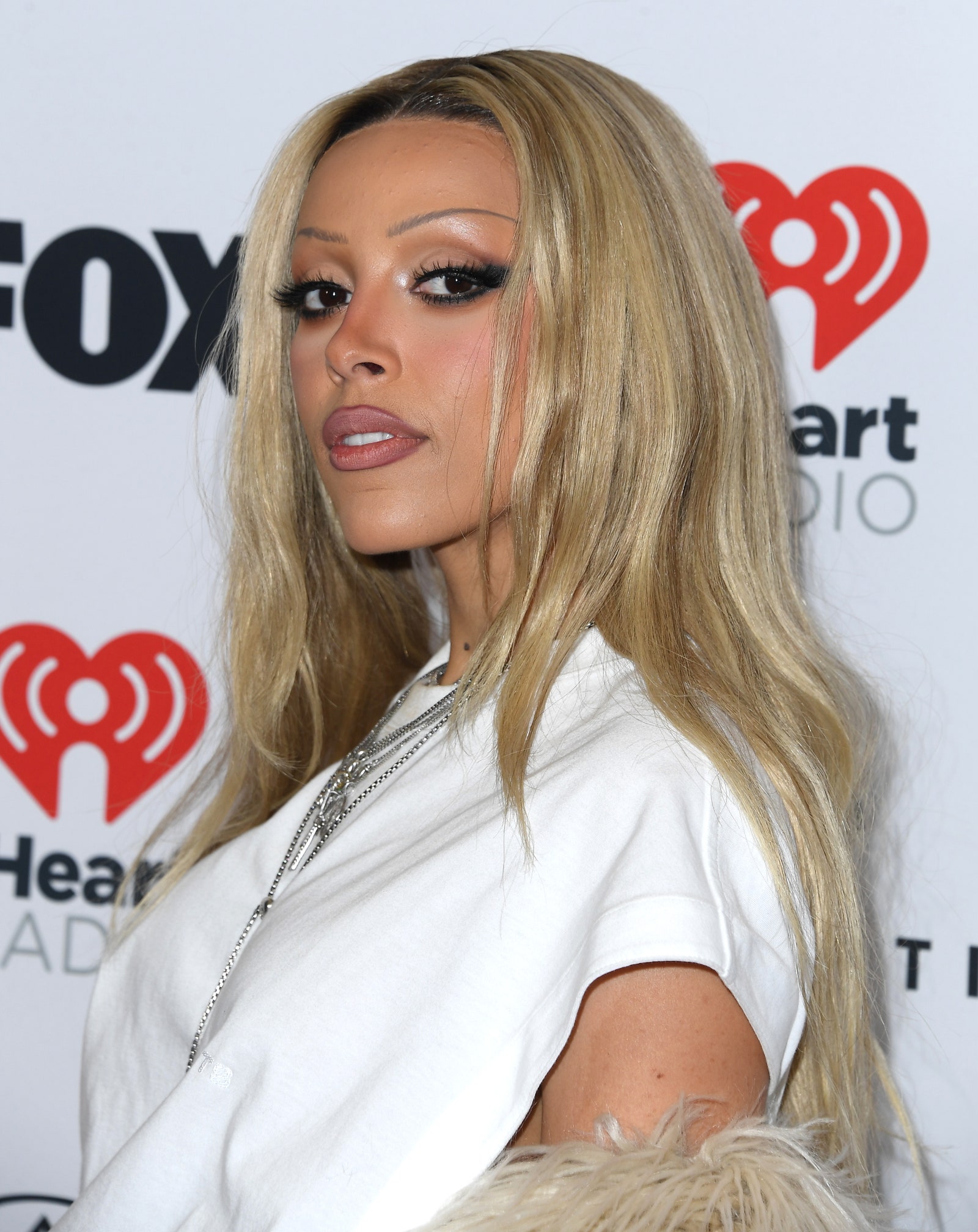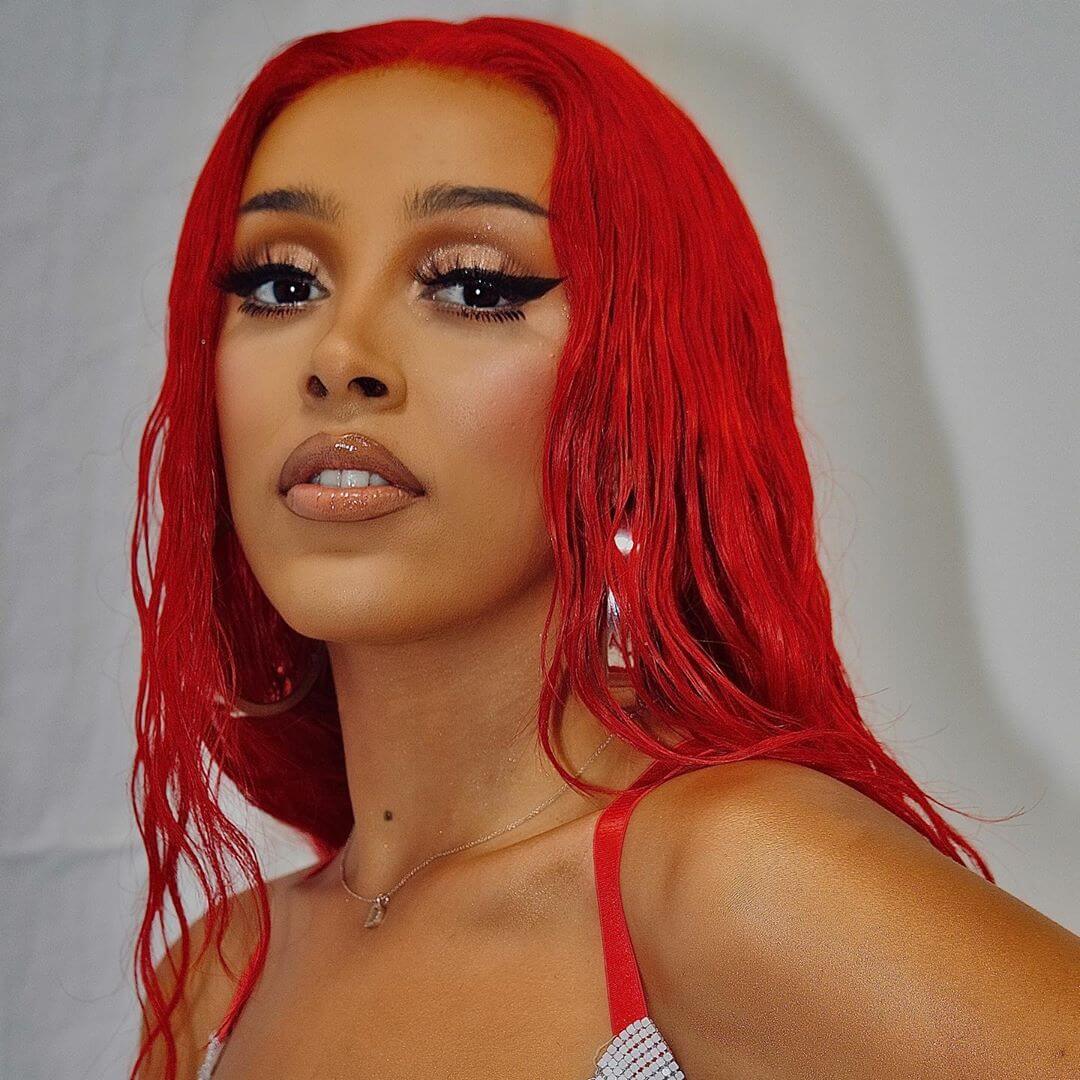Have you ever wondered what is Doja Cat's real name? The world-famous rapper, singer, and songwriter's real name is Amala Ratna Zandile Dlamini.
Born in Los Angeles, California, on October 21, 1995, Doja Cat is known for her eclectic musical style, which blends elements of hip hop, pop, R&B, and soul. She rose to fame in 2018 with her single "Mooo!," which went viral on social media. Since then, she has released several successful albums and singles, including "Say So," "Streets," and "Kiss Me More." Doja Cat has won numerous awards, including a Grammy Award for Best Rap Song for "Say So."
Doja Cat's real name, Amala, is of Zulu origin and means "pure" or "innocent." Ratna is a Sanskrit name meaning "gem" or "jewel," while Zandile is a Zulu name meaning "she who brings forth." Dlamini is her father's surname, which is also of Zulu origin. Doja Cat's unique name reflects her diverse heritage and her parents' hopes for her future success.
Doja Cat is a rising star in the music industry, and her real name, Amala Ratna Zandile Dlamini, is a reflection of her unique personality and her South African heritage.
What is Doja Cat's Real Name?
Doja Cat, the renowned rapper, singer, and songwriter, was born with the name Amala Ratna Zandile Dlamini. Her unique name holds cultural significance and reflects her diverse heritage.
- Origin: Amala is of Zulu origin, meaning "pure" or "innocent."
- Meaning: Ratna is a Sanskrit name meaning "gem" or "jewel."
- Heritage: Zandile is a Zulu name meaning "she who brings forth," representing her South African roots.
- Family: Dlamini is her father's surname, also of Zulu origin.
- Stage Name: Doja Cat was inspired by a type of cat and a strain of marijuana.
- Pronunciation: Her name is pronounced as "doe-juh cat."
Doja Cat's real name embodies her multicultural background and her parents' hopes for her success. As a rising star in the music industry, she embraces her unique identity and inspires others to celebrate their own diverse heritage.
| Name | Amala Ratna Zandile Dlamini |
|---|---|
| Stage Name | Doja Cat |
| Birth Date | October 21, 1995 |
| Birth Place | Los Angeles, California |
| Occupation | Rapper, singer, songwriter |
| Genre | Hip hop, pop, R&B, soul |
| Awards | Grammy Award for Best Rap Song ("Say So") |
Origin
The origin of Doja Cat's real name, Amala, holds cultural significance and reflects her South African heritage. In the Zulu language, Amala means "pure" or "innocent." This name choice by her parents symbolizes their hopes for her future success and their desire for her to embody these qualities throughout her life.
The meaning of Amala aligns with Doja Cat's personal values and aspirations. As a rising star in the music industry, she has remained grounded and true to herself. Her music often conveys messages of self-empowerment and authenticity, which resonate with her fans around the world.
Understanding the origin and meaning of Doja Cat's real name provides a deeper appreciation for her cultural identity and her connection to her South African roots. It also highlights the importance of embracing one's heritage and the values instilled by one's family.
Meaning
The name Ratna, meaning "gem" or "jewel" in Sanskrit, holds significant value in understanding Doja Cat's real name, Amala Ratna Zandile Dlamini. In many cultures, gemstones and jewels symbolize preciousness, beauty, and rarity. By incorporating Ratna into her name, Doja Cat's parents expressed their aspirations for her to be a cherished and extraordinary individual.
The concept of a "gem" or "jewel" resonates with Doja Cat's personal qualities and career trajectory. As a rising star in the music industry, she has showcased her unique talents and creative brilliance. Her ability to captivate audiences with her music and captivating performances has made her a true gem within the entertainment world.
Understanding the meaning of Ratna in Doja Cat's real name provides insights into her cultural heritage and the values instilled in her. It highlights the importance of embracing one's given name and the aspirations it carries. Doja Cat's real name serves as a constant reminder of her parents' love, hopes, and the precious qualities they envision within her.
Heritage
The name Zandile, meaning "she who brings forth" in Zulu, holds cultural significance and reflects Doja Cat's South African heritage. This name choice by her parents symbolizes their hopes for her to be a source of pride and accomplishment for her family and community.
- Cultural Identity: Zandile's name connects her to her Zulu ancestry and the rich cultural traditions of South Africa. It serves as a reminder of her roots and the importance of embracing her cultural heritage.
- Family Values: The name Zandile embodies the hopes and aspirations of Doja Cat's family. It represents their desire for her to be a successful and influential individual who brings honor to her family name.
- Personal Empowerment: The meaning of Zandile empowers Doja Cat to embrace her own unique talents and abilities. It encourages her to strive for greatness and to make a positive impact on the world.
- Connection to Community: Zandile's name connects her to the broader South African community. It represents her shared cultural identity and her commitment to uplifting her community through her music and platform.
Understanding the heritage behind the name Zandile provides a deeper appreciation for Doja Cat's cultural identity and her connection to her South African roots. It highlights the importance of embracing one's heritage and the values instilled by one's family and community.
Family
Understanding the connection between Doja Cat's surname, Dlamini, and her real name, Amala Ratna Zandile Dlamini, provides insights into her cultural identity and family heritage. The surname Dlamini holds significant meaning within the context of Zulu culture and traditions. This surname connects her to her father's lineage and the broader Zulu community.
- Cultural Identity: Doja Cat's surname, Dlamini, serves as a marker of her cultural identity. It links her to the Zulu ethnic group and its rich cultural traditions. By carrying this surname, she acknowledges and embraces her heritage.
- Family Lineage: The surname Dlamini signifies Doja Cat's paternal lineage. It establishes a connection between her and her father's family, tracing her ancestry and lineage within the Zulu community.
- Sense of Belonging: Doja Cat's surname, Dlamini, fosters a sense of belonging within the Zulu community. It connects her to a shared history, cultural practices, and values, strengthening her ties to her cultural roots.
- Respect and Recognition: In Zulu culture, surnames carry significant respect and recognition. Doja Cat's surname, Dlamini, acknowledges her family's standing within the community and the respect accorded to her lineage.
In conclusion, the connection between Doja Cat's surname, Dlamini, and her real name, Amala Ratna Zandile Dlamini, highlights the importance of cultural identity, family lineage, and community belonging. Her surname serves as a testament to her Zulu heritage and her deep connection to her cultural roots.
Stage Name
The stage name "Doja Cat" is a creative combination that draws inspiration from two distinct sources: a type of cat and a strain of marijuana. This unique name choice reflects Doja Cat's playful and eclectic personality, while also hinting at her South African roots.
- The Abyssinian Cat: Doja Cat's love for cats, particularly the Abyssinian breed, played a role in the creation of her stage name. Abyssinian cats are known for their distinctive ticked coats and playful nature, traits that resonate with Doja Cat's own personality and artistic style.
- The Doja Strain: The "Doja" in Doja Cat's stage name is also a nod to a strain of marijuana known for its uplifting and creative effects. This connection to cannabis culture aligns with Doja Cat's open and accepting attitude towards recreational drug use, which she has expressed through her music and social media presence.
Combining these two inspirations, "Doja Cat" emerged as a stage name that captures Doja Cat's unique blend of playfulness, creativity, and South African heritage. It allows her to express her multifaceted personality and connect with her fans on a personal level. While her real name, Amala Ratna Zandile Dlamini, holds cultural significance and family connections, her stage name "Doja Cat" reflects her artistic persona and the creative journey she has embarked upon.
Pronunciation
The pronunciation of Doja Cat's name is an integral part of her identity and artistic persona. Her unique name, Amala Ratna Zandile Dlamini, holds cultural significance and reflects her South African heritage. However, it is her stage name, "Doja Cat," that has gained global recognition, and its pronunciation plays a crucial role in shaping her public image and fan base.
- Cultural Context: The pronunciation of "Doja Cat" as "doe-juh cat" aligns with her South African background. In Zulu, the language spoken by the Zulu people of South Africa, the "j" sound is often pronounced as a "d" sound. This pronunciation reflects Doja Cat's cultural roots and pays homage to her heritage.
- Artistic Expression: The pronunciation of her stage name also serves as an artistic expression. Doja Cat has stated that she chose the name "Doja Cat" because it is playful, catchy, and easy to remember. The "doe-juh" sound adds a touch of whimsy and uniqueness, differentiating her from other artists in the music industry.
- Fan Connection: The pronunciation of Doja Cat's name fosters a sense of connection between her and her fans. By pronouncing her name correctly, fans demonstrate their appreciation for her culture and her artistic persona. This shared understanding creates a bond between the artist and her audience, enhancing their overall experience.
In conclusion, the pronunciation of Doja Cat's name, "doe-juh cat," is not merely a matter of phonetics; it is an expression of her cultural identity, artistic vision, and connection with her fans. It adds depth and nuance to her overall persona, making Doja Cat a truly unique and unforgettable figure in the entertainment industry.
FAQs about Doja Cat's Real Name
This section addresses frequently asked questions about the real name of the renowned rapper, singer, and songwriter, Doja Cat. By providing clear and informative answers, we aim to dispel any misconceptions and enhance understanding of her cultural identity and artistic persona.
Question 1: What is Doja Cat's real name?
Answer: Doja Cat's real name is Amala Ratna Zandile Dlamini.
Question 2: What is the meaning behind her real name?
Answer: Doja Cat's real name holds significant cultural meaning. Amala means "pure" or "innocent" in Zulu, Ratna means "gem" or "jewel" in Sanskrit, Zandile means "she who brings forth" in Zulu, and Dlamini is her father's surname, also of Zulu origin.
Question 3: How is Doja Cat's stage name connected to her real name?
Answer: Doja Cat's stage name is inspired by her love for Abyssinian cats and a strain of marijuana known as "Doja." The combination of these elements reflects her playful and eclectic personality.
Question 4: How is Doja Cat's real name pronounced?
Answer: Doja Cat's real name is pronounced as "doe-juh cat." The "j" sound in her name is pronounced as a "d" sound, which is common in the Zulu language.
Question 5: What is the significance of Doja Cat's Zulu heritage?
Answer: Doja Cat's Zulu heritage plays a vital role in shaping her identity and artistic expression. Her Zulu name, the pronunciation of her stage name, and her connection to South African culture are all testaments to her cultural roots.
Question 6: How does Doja Cat's real name reflect her multifaceted persona?
Answer: Doja Cat's real name, Amala Ratna Zandile Dlamini, embodies her diverse heritage, cultural values, and artistic vision. It represents the confluence of her South African roots, her personal qualities, and her creative expression.
Understanding the significance and meaning behind Doja Cat's real name provides a deeper appreciation for her cultural identity and her journey as an artist. Her name serves as a reminder of her cultural heritage, her personal values, and her unique contribution to the music industry.
Transition to the next article section...
Tips for Understanding Doja Cat's Real Name
Understanding the meaning and significance of Doja Cat's real name, Amala Ratna Zandile Dlamini, provides deeper insights into her cultural identity and artistic persona. Here are some tips to enhance your comprehension:
Tip 1: Research the Cultural Origins of Her Name
Explore the Zulu and Sanskrit origins of Doja Cat's name. Learn about the cultural significance and meanings of Amala, Ratna, Zandile, and Dlamini. This knowledge will provide a foundation for understanding her cultural heritage.
Tip 2: Understand the Pronunciation of Her Name
The pronunciation of Doja Cat's name, "doe-juh cat," is influenced by her Zulu heritage. Familiarize yourself with the pronunciation of the "j" sound in Zulu, which is often pronounced as a "d" sound.
Tip 3: Explore the Connection Between Her Stage Name and Real Name
Analyze how Doja Cat's stage name, derived from her love for Abyssinian cats and a strain of marijuana, relates to her real name. Understand the interplay between her personal life and artistic expression.
Tip 4: Examine the Cultural Significance of Her Zulu Heritage
Investigate the cultural traditions, values, and history of the Zulu people. Recognize how Doja Cat's Zulu heritage shapes her identity and influences her music.
Tip 5: Appreciate the Multifaceted Nature of Her Name
Reflect on how Doja Cat's real name encompasses her diverse heritage, personal qualities, and artistic vision. Understand the significance of each element of her name and how it contributes to her overall persona.
By following these tips, you can gain a deeper appreciation for the meaning and significance of Doja Cat's real name. This understanding enriches your comprehension of her cultural identity and artistic expression.
Transition to the article's conclusion...
Conclusion
This exploration of "what is Doja Cat's real name" has delved into the cultural significance, meaning, and pronunciation of her name, Amala Ratna Zandile Dlamini. By understanding the origins and meanings of each element of her name, we gain a deeper appreciation for her South African heritage and her multifaceted persona.
Doja Cat's real name encapsulates her cultural identity, personal values, and artistic vision. It serves as a reminder of her unique journey as an artist and her connection to her Zulu roots. Understanding the significance of her name enhances our appreciation for her music and allows us to engage more deeply with her artistry.
Try These Raunchy Dares Over Text For Couples Looking For A Good Time
Comprehensive Breakdown: Anna Shay's Net Worth In 2023
Top Female TV Cartoon Characters: Leading Ladies On The Small Screen

Pictures Of Doja Cat's Parents Doja Cat Biography Real Name, Age

Doja Cat Just Shared an Unfiltered Photo of Her Breakouts, and It's So

Doja Cat Real Name The Millennial Mirror
ncG1vNJzZmiin6jAb67LqJlnm5%2Bnsm%2FDyKebqK%2BjY7umwI6fqaillWZ8uLTArWSiq12ZvKutjJyYratdp7KiuIynmKadXp3Brrg%3D